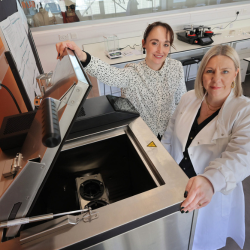-
Study
-
Undergraduate
- Search for a Course
- Undergraduate Open Day & Events
- Application Guides
- Northumbria University UCAS Exhibitions
- Foundation Years
- Undergraduate Fees & Funding
- School & College Outreach
- Continuing Professional Development
-
Postgraduate
- Postgraduate Study Degree
- Postgraduate Research Degrees
- Postgraduate Open Days and Events
- Postgraduate Fees & Funding
- Flexible Learning
- Thinking about a Masters?
- Continuing Professional Development
- Change Direction
-
Student Life
- The Hub - Student Blog
- Accommodation
- Life in Newcastle
- Support for Students
- Careers
- Information for Parents
- Students' Union
- Northumbria Sport
- Be Part of It
-
-
International
International
Northumbria’s global footprint touches every continent across the world, through our global partnerships across 17 institutions in 10 countries, to our 277,000 strong alumni community and 150 recruitment partners – we prepare our students for the challenges of tomorrow. Discover more about how to join Northumbria’s global family or our partnerships.
View our Global Footprint-
Applying to Northumbria
- European Union
- Our London Campus
- Northumbria Pathway
- International Events
- Entry Requirement and Education Country Agents
- Global Offices
-
Northumbria Language Centre
- Faculty Requirements
- Acceptable English Requirements
- Pre-sessional English Language and Study Skills
- Academic Language Skills Programmes (ALS)
-
International Fees, Funding & Scholarships
- International Undergraduate Fees
- International Undergraduate Funding
- International Masters Fees
- International Masters Funding
- International Postgraduate Research Fees
- International Postgraduate Research Funding
- International Money Matters
-
Life at Northumbria
- International student support
- Careers
-
International Mobility
- Current Northumbria Students
- Incoming Exchange Students
-
-
Business
Business
The world is changing faster than ever before. The future is there to be won by organisations who find ways to turn today's possibilities into tomorrows competitive edge. In a connected world, collaboration can be the key to success.
More on our Business Services -
Research
Research
Northumbria is a research-rich, business-focused, professional university with a global reputation for academic quality. We conduct ground-breaking research that is responsive to the science & technology, health & well being, economic and social and arts & cultural needs for the communities
Discover more about our Research -
About Us
-
About Northumbria
- Our Strategy
- Our Staff
- Place and Partnerships
- Student Profiles
- Alumni Profiles
- Leadership & Governance
- Academic Departments
- University Services
- History of Northumbria
- Contact us
- Online Shop
-
-
Alumni
Alumni
Northumbria University is renowned for the calibre of its business-ready graduates. Our alumni network has over 246,000 graduates based in 178 countries worldwide in a range of sectors, our alumni are making a real impact on the world.
Our Alumni - Work For Us
What will I learn on this module?
This module will develop you in all four pillars of advanced clinical practice, with particular emphasis on the research, leadership and management, and education pillars. In the module you will critically explore a range of approaches to research, undertake a research study as your dissertation, produce a project report, and present your findings.
For the written component of this module, emphasis will be placed on your understanding of the world view, design and meaning system that will drive your own research study that will form your dissertation. You will pick between an Empirical Project, Service Improvement or Systematic Appraisal. In the module you will revisit and deepen your understandings of a range of key topics linked to the research process; this will include discussion of world views and research paradigms; the research question, aim or hypothesis; research design; working with literature and theory; developing ethical codes; constructing the research sample, collecting robust research evidence, ensuring quality assurance within your research work; analysing both qualitative and quantitative evidence; and writing and disseminating your dissertation findings. You will be invited to attend a series of research seminars during the module, and you will have access to a named supervisor for one-to-one supervision. Both the seminars and supervision will encourage you to apply the key areas of learning within this module to your own professional context and field of expertise. This will enable you to critically examine how the research process will work best for your research interests.
The module is the culmination of your ACP studies, and you will critically reflect on your overall development as an advanced clinical practitioner, bring together your on-programme learning, and demonstrate how you now work to all four pillars of the advanced practice framework. This will be evidenced by submitting your completed advanced practice portfolios one and two, to include all module assessment components.
If you are studying for a specialist named award, you will be expected to develop your research project and portfolio to evidence that you have achieved the nationally recognised standard of advanced practice associated with that award. Please refer to the programme specification document for more information about specialist named awards.
How will I learn on this module?
You will participate in this module as an active, self-directed learner. The module will be built around several activities that will help you to explore the different aspects of undertaking a robust research study, identify your dissertation choice (Empirical Project, Service Improvement or Systematic Appraisal), prepare for your presentation and to help you to identify how your ACP development can be mapped to the Multiprofessional framework for advanced clinical practice in England (2017). This will be achieved through seminars, independent learning activities, individual dissertation supervision, and by operating as a project coordinator and leader.
You will work with a named supervisor for the duration of your research study. This will involve one-to-one contact will provide you with the opportunity for individualised supervision to discuss your project and its ongoing development. This individualised support will enable you to explore areas of the work that are troublesome and the critical dialogue that it enables will help you to develop your understanding of the theoretical, methodological, and practical aspects of your dissertation choice. In addition to this supervised work, you will be encouraged to attend a series of research seminars that will also follow the path of your project during the span of your programme. The research seminars normally involve a small group of individuals from a variety of programmes who are all immersed in the research process. This group of peers is invaluable to the social learning processes that drive the research component of this module. During each seminar, it is expected that individuals will share their research challenges and successes. The sharing of understandings and experiences will be an integral part of the way in which the module helps to socially construct an individual’s perceptions of their work.
The module aims to enable you to develop an effective and successful dissertation, focus on your own development as a proficient researcher in your practice area, and demonstrate your transition to an autonomous advanced clinical practitioner. You will also be expected to develop and apply your knowledge and skills in the clinical practice environment, and you will work with your employer and educational (clinical) supervisor to identify learning opportunities appropriate to your ongoing development. You must successfully complete both theoretical and competence-based assessments for this module.
How will I be supported academically on this module?
You will be supported by the module lead, educational (clinical) supervisor, programme team and an allocated named supervisor on this module.
Your module lead and educational (clinical) supervisor will help you to identify your dissertation choice. Your module lead can also be contacted to offer module guidance when necessary.
Portfolio one (theoretical component): You will be allocated a named academic supervisor for the duration of the module. Supervisors bring a wide range of expertise to help your learning and will use a variety of approaches to help you conceptualise, focus, plan and implement your dissertation study: this will include, but will not be restricted to, feedback on your ideas, proposals, and plans. While selected for their professional and academic expertise and experience, consideration is also given to your project subject, and where possible every effort is made to match this with the interest area of the supervisor. If you are allocated a dissertation supervisor that is not your personal tutor, they will assume the role of personal tutor for the rest of your studies.
Portfolio two (practical component): You will be assigned an educational (clinical) supervisor whose responsibility it is to ensure that you are supported in your clinical practice area, have the appropriate experiences to allow you to progress, monitor your progress, and provide individual feedback and sign off your competence documentation. Methods of learning development and assessment include Assessment of Clinical Expertise (ACE or mini-ACE) Case-Based Discussions (CBD), Mini Clinical Evaluation Exercise (MiniCEX), Directly Observed Practical Skills (DOPS), Multisource Feedback (MSF) and Acute Care Assessment Tool (ACAT) where appropriate. These are recognised methods of assessment used by medical practitioners and endorsed by several medical colleges, including the Royal College of Physicians. You will be required to engage in regular tripartite/progress meetings with your educational (clinical) supervisor and Personal Tutor to provide support for your development.
The programme team will support you throughout the whole of your programme of study providing regular contact points to reflect on your advanced practice development. This will help you to help you to prepare for this dissertation portfolio module.
The University Library offers an extensive collection of material, both hard copy and electronic, access to international databases, and training in information retrieval, in addition to study space and IT equipment. Study skills help sheets can be found on the Library’s Skills Plus site. In addition, the University Student Support and Wellbeing Services offer information, guidance, and support.
What will I be expected to read on this module?
All modules at Northumbria include a range of reading materials that students are expected to engage with. Online reading lists (provided after enrolment) give you access to your reading material for your modules. The Library works in partnership with your module tutors to ensure you have access to the material that you need.
What will I be expected to achieve?
Knowledge & Understanding:
1. Conceptualise a research topic and establish its relevance to your practice area/field of expertise.
2. Utilise relevant philosophical and theoretical underpinnings to implement a research project demonstrating critical awareness and evaluation of the needs of the service user, the service, and the practice context.
3. Robustly critique your role development as an advanced clinical practitioner
Intellectual / Professional skills & abilities:
4. Use contemporary evidence to construct, successfully manage and evaluate a research project of your choice (Empirical Project, Service Improvement or Systematic Appraisal)
5. Produce a written project report, identify, and present future development needs for your service based on critical analysis and reflections on your research study.
6. Demonstrate the ability to collaborate and negotiate with service users (where appropriate), stakeholders and colleagues and consider multiple perspectives when planning change.
Personal Values Attributes (Global / Cultural awareness, Ethics, Curiosity) (PVA):
7. Critically examine ethical issues related to healthcare delivery, relevant to your chosen research project.
8. Demonstrate your ability to be self-aware and reflexive practitioner when working in your advanced practice role.
How will I be assessed?
Formative: In this module formative assessment will normally focus on your developing research study and be decided by you and your supervisor. You will be encouraged to share parts of your written work with your supervisor prior to final submission. Additional formative feedback will come from the sharing of project work during seminar discussions.
There will be additional seminars throughout the programme to help you to prepare for submission of your final portfolio and for the open book exam.
MLOs- All.
Summative:
PORTFOLIO ONE:
PART A: A 10,000-word dissertation to present your chosen research study.
- Empirical Project: develop and implement a small-scale empirical study to explore a research question
- Service Improvement: using an evidence-based approach, construct and successfully manage the implementation of a Service Improvement
- Systematic Appraisal: engage in a robust research process where you will systematically appraise evidence-based published studies to answer your identified research questions(s).
The dissertation structure will vary depending on your choice, but all will include a common core; using academic inquiry to introduce your study, debate its relevance, and present your study. Guidance on the structure of your dissertation will be provided in the module handbook, on the eLearning portal and during supervision and seminars. You will submit an electronic copy of your dissertation and you will receive electronic feedback via the eLearning portal.
(Weighting = 70%)
MLOs: - 1, 2, 4, 7, 8
PART B: Completion of a 2-hour open book exam evidencing how you meet the Clinical Practice pillar as identified in the HEE Framework for advanced practice. The exam will be based on 3 case studies that you have developed from your practice
(Weighting = PASS/ FAIL)
MLOs 3, 8
PART C: You will produce a 1500-word report identifying a practice change. You will outline the change using an evidence-based background and provide a proposed approach to managing this change. Your dissertation can underpin this proposal.
(Weighting = 10%)
MLOs: 5, 6, 7, 8
PART D: A 25-minute panel presentation of your proposed practice change followed by up to 10 minutes of questions for the panel to gain clarification of any aspect of your practice change or presentation. In this presentation you will be expected to articulate your role in organisational development, as an advanced practitioner. Your presentation feedback should be included in your portfolio. You will submit a hardcopy of your portfolio and you will receive electronic feedback for each component via the eLearning portal.
(Weighting = 20%)
MLOs: 5, 6, 7, 8
PORTFOLIO TWO:
Completion of a competence-based documents for years 1, 2 and 3 of the programme. If you are studying for a specialist named award, you will be expected to complete your research project and portfolio of clinical competencies in the context of the nationally recognised standard of advanced practice associated with that award. Please refer to the programme specification document for more information about specialist named awards.
(Weighting = PASS/FAIL)
MLOs: All
Pre-requisite(s)
1. AC7050 Service Improvement and Research Methods in Advanced Clinical Practice or equivalent
Co-requisite(s)
None
Module abstract
This module is the culmination of your advanced practice studies and is designed to showcase your development as an autonomous practitioner in line with all four pillars of advanced clinical practice as identified by HEE.
The module will develop you as a researcher as you undertake a research project that is relevant and important to your practice and field of expertise, thus enabling you to continue contributing to advanced level practice throughout your career. Assessment of the module is by a theoretical component and a competence-based component via the submission of two portfolios:
PORTFOLIO ONE - The theoretical component, will contain the following parts:
• PART A: A 10,000-word dissertation to present your chosen research study.
- Empirical Project: develop and implement a small-scale empirical study to explore a research question
- Service Improvement: using an evidence-based approach, construct and successfully manage the implementation of a Service Improvement
- Systematic Appraisal: engage in a robust research process where you will systematically appraise evidence-based published studies to answer your identified research questions(s).
The dissertation structure will vary depending on your choice, but all will include a common core; using academic inquiry to introduce your study, debate its relevance, and present your study. Guidance on the structure of your dissertation will be provided in the module handbook, on the eLearning portal and during supervision and seminars. You will submit an electronic copy of your dissertation and you will receive electronic feedback via the eLearning portal.
• PART B: Completion of a 2-hour open book exam evidencing how you meet the Clinical Practice pillar as identified in the HEE Framework for advanced practice. The exam will be based on 3 case studies that you have developed from your practice
• PART C: You will produce a 1500-word report identifying a practice change. You will outline the change using an evidence-based background and provide a proposed approach to managing this change. Your dissertation can underpin this proposal.
• PART D: A 25-minute panel presentation of your proposed practice change followed by up to 10 minutes of questions for the panel to gain clarification of any aspect of your practice change or presentation. In this presentation you will be expected to articulate your role in organisational development, as an advanced practitioner. Your presentation feedback should be included in your portfolio.
PORTFOLIO TWO – The clinical-based component, will contain the following:
• Completion of a competence-based documents for years 1, 2 and 3 of the programme. If you are studying for a specialist named award, you will be expected to complete your research project and portfolio of clinical competencies in the context of the nationally recognised standard of advanced practice associated with that award. Please refer to the programme specification document for more information about specialist named awards. You will also be expected to develop and apply your knowledge and skills in the clinical practice environment, and you will work with your employer and educational (clinical) supervisor to identify learning opportunities appropriate to your ongoing development. You must successfully complete both theoretical and competence-based assessments for this module.
Course info
Credits 60
Level of Study Postgraduate
Mode of Study 3 years Part Time
Location Coach Lane Campus, Northumbria University
City Newcastle
Start January 2026 or March 2026
All information is accurate at the time of sharing.
Full time Courses are primarily delivered via on-campus face to face learning but could include elements of online learning. Most courses run as planned and as promoted on our website and via our marketing materials, but if there are any substantial changes (as determined by the Competition and Markets Authority) to a course or there is the potential that course may be withdrawn, we will notify all affected applicants as soon as possible with advice and guidance regarding their options. It is also important to be aware that optional modules listed on course pages may be subject to change depending on uptake numbers each year.
Contact time is subject to increase or decrease in line with possible restrictions imposed by the government or the University in the interest of maintaining the health and safety and wellbeing of students, staff, and visitors if this is deemed necessary in future.
Useful Links
Find out about our distinctive approach at
www.northumbria.ac.uk/exp
Admissions Terms and Conditions
northumbria.ac.uk/terms
Fees and Funding
northumbria.ac.uk/fees
Admissions Policy
northumbria.ac.uk/adpolicy
Admissions Complaints Policy
northumbria.ac.uk/complaints














